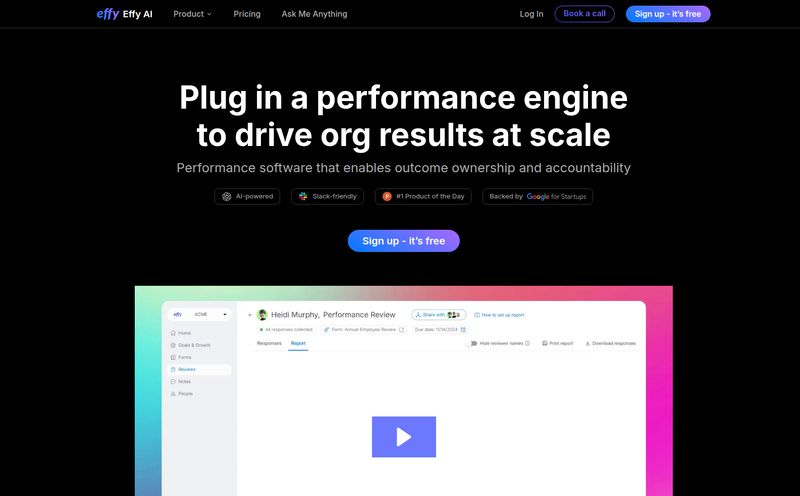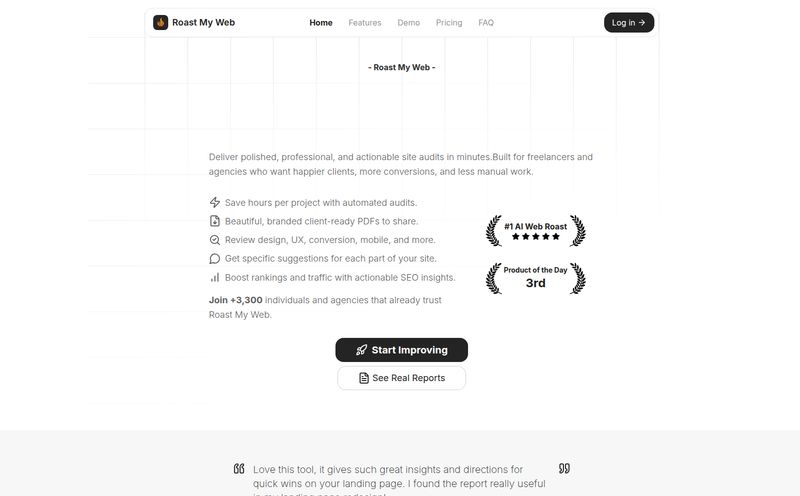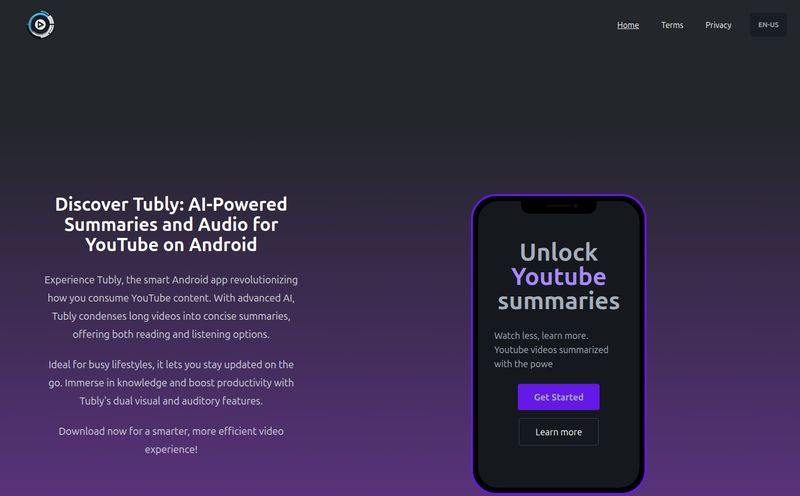I can still smell it. The weirdly specific scent of a fresh pack of index cards, the sharp tang of a dying highlighter, and the faint aroma of stale coffee. That was the scent of my university finals week. Hours upon hours spent hunched over textbooks, trying to distill dense chapters into bite-sized, digestible notes. My handwriting would devolve from neat cursive to something resembling an ancient, cursed script. My hand would cramp. My soul would hurt.
We’ve all been there, right? The drudgery of creating revision materials is almost as painful as the studying itself. It's a necessary evil, a mountain we all have to climb. But what if it wasn't?
That's the promise of a new wave of Edtech tools powered by artificial intelligence. And today, we're looking at one that caught my eye: Flashalgo. It claims to be an AI platform that generates flashcards and multiple-choice questions (MCQs) for you, saving you precious, precious time. But as someone who's seen countless 'revolutionary' tools come and go, my professional skepticism is tingling. Let's see if it's the real deal.

Visit flashalgo
So, What's the Deal with Flashalgo?
At its core, Flashalgo is beautifully simple in its proposition. You feed it your content—lecture notes, a PDF of a chapter, a long-winded article—and its AI engine gets to work. Think of it as a highly efficient, tireless research assistant. It reads and understands the material, identifies the most important concepts, and then transforms them into classic study aids: flashcards and practice questions.
This isn't just about randomly pulling sentences. A good AI, in theory, can identify key definitions, important dates, cause-and-effect relationships, and the kind of nuanced details that professors love to put on exams. The goal is to slash the time you spend on the creation of study materials, so you can spend more time on the actual learning. A noble goal, I must admit.
The Core Features That Actually Matter
A tool can have a million bells and whistles, but it's the core functionality that determines if it becomes a daily driver or just more digital clutter. Flashalgo seems to be focusing on two very specific, high-impact areas.
Instant Flashcards Without the Hand Cramps
Let's be honest, making flashcards is a chore. A useful one, but a chore nonetheless. You have to identify the term, flip the card, write the definition, and repeat a hundred times. Flashalgo’s main draw is automating this process entirely. The potential here is massive. Imagine finishing a two-hour lecture, uploading your messy notes, and having a complete, ready-to-use deck of digital flashcards in minutes. This frees you up to immediately start practicing active recall, which as we know, is one of the most effective ways to cement knowledge in your brain. It's a game-changer for anyone who has ever stared at a mountain of textbooks and felt a wave of pure exhaustion.
Practice Makes Perfect with AI-Generated MCQs
Multiple-choice questions are the bread and butter of so many exams. But finding good practice questions, especially ones tailored to your specific course materials, can be tough. Textbooks often have a few at the end of each chapter, but they're limited. Flashalgo’s ability to generate custom MCQs from your own notes is… intriguing. A good MCQ doesn't just test your memory; it tests your understanding with plausible-sounding wrong answers (distractors). If the AI is sophisticated enough to create these, it could be an incredible tool for self-assessment, helping you pinpoint exactly which areas you’re still fuzzy on before the big day.
My Honest Opinion: The Bright Spots and the Red Flags
No tool is perfect. As an SEO and traffic guy, I see people fall for hype all the time. So, let’s put on our critical thinking hats and look at this with a balanced perspective. It's easy to see the shiny, positive side. The time-saving aspect is undeniable. For a busy student juggling multiple classes, a part-time job, and maybe even a semblance of a social life, clawing back hours every week is pure gold. Plus, having the AI pull out key concepts can help you focus on what’s truly important, cutting through the fluff that often pads out academic texts.
But—and there's always a but—we have to talk about the potential downsides. The first, and most obvious, is quality. The effectiveness of the flashcards and MCQs is completely at the mercy of the AI's algorithm. A poorly trained or simplistic AI might generate superficial questions, miss crucial nuances, or even get things plain wrong. Garbage in, garbage out, as they say. Your study materials are only as good as the machine that made them.
"I've always felt the act of writing out my own notes was part of the learning process itself. It forces you to engage, to rephrase, to synthesize. Handing that process over to a machine feels... efficient, but maybe a little hollow?"
This leads to my biggest concern: the risk of over-reliance. The struggle of summarizing a chapter is, in itself, a form of learning. By outsourcing that struggle, are we skipping a critical cognitive step? It's the classic 'calculator problem'—if you always have a calculator, you might never get really good at mental math. If you always have an AI making your notes, you might not develop teh skill of synthesizing complex information on your own. It's a tightrope walk between smart outsourcing and intellectual laziness.
The Big Question: Is Relying on AI for Studying a Bad Thing?
Some professors and old-school academics might clutch their pearls at the thought of a tool like Flashalgo. "That's cheating!" or "Students aren't learning!" I get it. I really do. But I think that's a slightly outdated view.
Technology has always changed how we learn. We moved from oral traditions to written scrolls, from scrolls to printed books, from books to the internet. Each step was met with fear that we were losing something essential. I see tools like Flashalgo not as a replacement for thinking, but as a potential enhancement. The real learning doesn't happen when you're writing the flashcard; it happens when you're using it. It happens during the active recall, the self-quizzing, the spaced repetition. If a tool can get you to that stage faster and more often, I’d argue that's a net positive. The trick is to use it as a starting point, not a finish line. Use the AI-generated materials to quiz yourself, then go back to the source text to fill in the gaps. Use it to build a foundation, not the entire house.
What's This Going to Cost Me?
Ah, the million-dollar question. As of my writing this, Flashalgo's pricing is not publicly available. This is pretty common for new platforms in the startup phase. They're likely still figuring out their business model. I'd expect to see a few potential options roll out:
- A Freemium Model: A certain number of flashcard decks or MCQs for free per month, with a subscription to unlock unlimited use. This is the most likely path.
- A Tiered Subscription: A basic plan for individual students and maybe a more expensive 'Pro' or 'Team' plan for study groups or educational institutions.
- A Pay-Per-Use Model: Credits to generate materials, though this feels less likely for a student-focused tool.
I'll be keeping an eye on their site and will update this article as soon as pricing information drops.
Is Flashalgo Right for You?
So, who is the ideal user for a tool like this? I think it's perfect for the student who is chronically short on time and dealing with information-heavy subjects. Think biology, history, law, medicine—any field where you have to memorize a large volume of facts, definitions, and concepts. It's also great for students who know they should be using flashcards but can never find the motivation or time to create them. If you're a kinesthetic learner who absolutely needs the physical act of writing to learn, this might not replace your trusty index cards. But for everyone else, it’s certainly worth a look.
My Final Take
Flashalgo is entering a crowded space, but its focused approach is smart. By concentrating on the two most tedious aspects of studying, it addresses a real, tangible pain point for students everywhere. It’s not a magic wand that will grant you an A+ without any effort. You still have to do the hard work of learning. But it has the potential to be a powerful ally, a force multiplier that handles the grunt work so you can focus on what matters. It's a tool that helps you study smarter, not just harder. And in a world that demands more and more of our time and attention, that’s a very compelling proposition indeed.
Frequently Asked Questions
What is Flashalgo exactly?
Flashalgo is an AI-powered educational technology (Edtech) platform. Its main function is to automatically generate study materials, specifically digital flashcards and multiple-choice questions (MCQs), from notes or documents that you provide.
How does Flashalgo create the flashcards?
While the exact process is proprietary, it uses natural language processing (NLP) algorithms to read and analyze your text. The AI identifies key terms, definitions, concepts, and important facts, and then structures this information into a question/answer format suitable for flashcards.
Is using a tool like Flashalgo considered cheating?
Most educators would not consider this cheating. You are still using your own course materials, and you still have to do the actual work of learning from the flashcards and questions. It's a time-saving tool for creating study aids, not a tool that provides answers on a test. However, it's always a good idea to check your institution's specific academic integrity policy.
Can Flashalgo help with any subject?
It should be effective for most subjects, but it will likely be most useful for subjects that are heavy on memorization and factual recall, such as history, biology, law, vocabulary, and anatomy. It might be less effective for subjects based on abstract problem-solving, like advanced mathematics or theoretical physics.
Is Flashalgo free to use?
Currently, Flashalgo has not released its official pricing structure. It's possible they will offer a free trial or a freemium version, but you should expect that full, unlimited access will likely require a paid subscription in the future.
References and Sources
- Vanderbilt University Center for Teaching - Active Learning. A great resource on the principles that make tools like flashcards effective.



